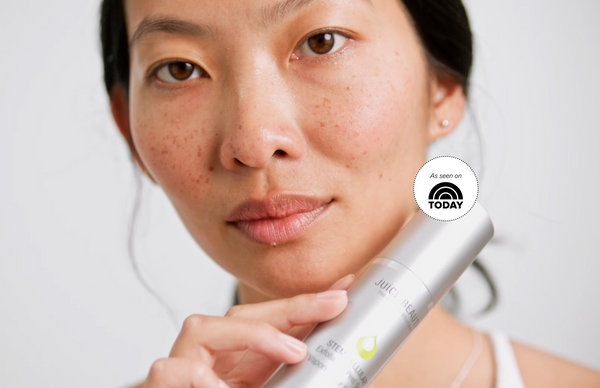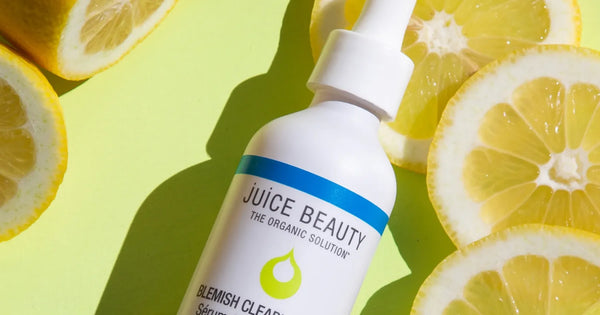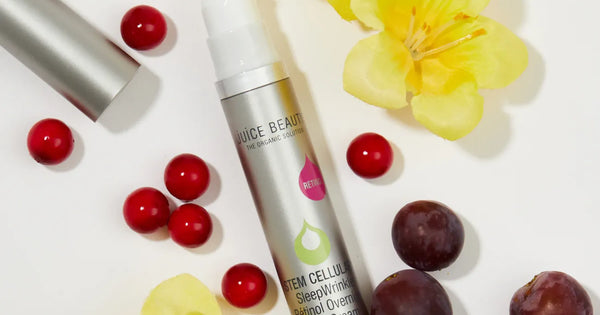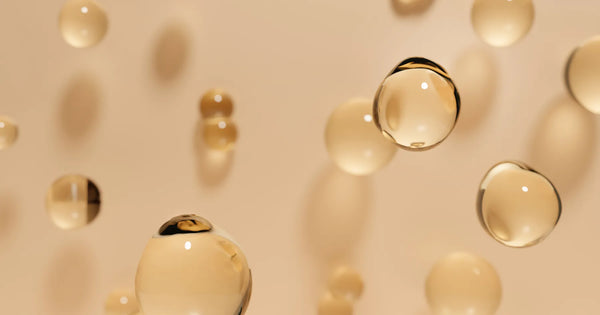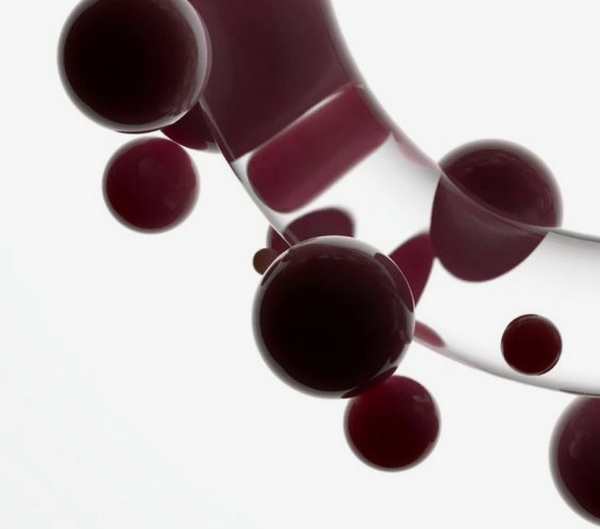Does your skin feel dry, tight, or itchy? If so, you’re not alone. More than half of the adult population struggles with dry skin, and that percentage only increases with age.
This makes relieving dry skin a top priority in your skincare routine.
Stick around to learn what skincare ingredients to use, which ones to avoid, and how to ease dry skin on your face with Juice Beauty.
What Is Dry Skin?
Your skin is designed to be oily. Not excess oil, but the organ depends on a certain amount of health oils, fats, and lipids to stay nourished and perform its job. When skin does contain enough of these good oils, it becomes dry.
Dry skin is a common skin concern that affects almost everyone at some point or another. However, it’s also a skin type. Different from just the occasional dry hands or chapped lips, dry skin types struggle with dryness constantly.
Symptoms of dry skin include:
- Patches of rough, flaky, or scaly skin
- Skin redness
- Itchiness, ranging from mild to severe
- Skin that feels stretched to tight
- Cracked skin, sometimes to the point of bleeding
- Thinning skin
- Discolored skin that may appear gray, white, or even black
What Causes Dry Skin?
A lot of people know what dry skin is (they may even have it themselves), but they have no clue what actually causes the skin condition. Especially if you’re looking to relieve your own dryness, it’s helpful to know what’s causing the tight, irritated skin so that you can best soothe it.
There are several factors that can contribute to dry skin. Let’s take a look at the most common ones.
Natural Aging
Your skin is already equipped with its own oil-making system. Sebaceous glands in the middle layer of your skin produce about 8 milligrams of sebum for every 10 centimeters of skin every day, which is more than enough to lubricate the skin barrier and lock in your body’s natural moisture.
However, this number is only an average. Not all skin can produce enough sebum on its own.
As you age, your body’s endocrine system starts to slow down — and the androgen hormone that stimulates sebum production does, too. Without this hormone to signal your sebaceous glands to kick into gear, your skin can start to dry out, triggering symptoms of dry skin.
Cold, Dry Air
The environment has a huge impact on your skin. The temperature humidity level of the air around you can determine how nourished or dry your skin feels. Generally speaking, cold and dry climates are the worst for your skin, and can contribute to irritation and flaking on your facial skin.
Dry air is dangerous because it can steal moisture from you. Your skin is always secreting small amounts of water through a biological process called transepidermal water loss (TEWL).
While some of this loss is controlled by your skin, it’s heavily influenced by environmental factors. When the air around is drier than your skin, TEWL rates spike, leaving you with not enough water to keep your skin hydrated.
Hot, Dry Air
Cold air isn’t the only threat to your skin. Sometimes, hot air can be just as dangerous.
Typically, warm air contains a high concentration of water vapor, making it nourishing for your skin. However, the hot air pushed out by heating units — like the furnaces and fireplaces you might encounter in the winter — has an extremely low humidity because it originated as cold air from outside.
Increasing the air’s temperature doesn’t raise it’s humidity. In fact, it can lower it. So while this hot air can feel good on your skin in the moment, in the long run, it is one of the biggest contributers to dry skin.
Overexfoliation
If you have oily skin, exfoliators are your best friend. These scrubbing agents are perfect at clearing out all of the excess oil produced by the skin. However, for skin types that struggle to produce enough oil on their own, these same ingredients can be your worst nightmare.
Dry skin types need to be careful when it comes to exfoliation. While a little but of scrubbing power can help clear away dead skin cells that are contributing to rough patches, too much can rub raw the already-sensitive skin.
Even normal skin types should be careful with overexfoliation, as removing too much oil can leave the skin feeling dry and undernourished as a side effect.
Harsh Soaps and Detergents
Certain face cleansers, body washes, and even hand soaps are formulated with harsh chemicals that can strip your skin’s moisture and irritate your skin. These products are often designed with good intentions: their goal is to absorb excess oil that can clog your pores and cause breakouts.
However, they can’t always distinguish the good oils from the bad. Ingredients like sulfates and colored dyes suck the natural oils from your skin, leaving behind a dry and itchy surface.
Other skincare ingredients to avoid using on dry skin include:
- Salicylic acid
- Glycolic acid
- High concentrations of retinol
- Alcohol-based formulas
- Fragrances and perfumes
3 Ingredients To Soothe Dry Skin
While staying away from dehydrating agents is helpful, soothing your skin is about much more than avoiding the wrong ingredients. To truly relieve your dry skin, you need to nourish it with the right ones.
Here are three hydrating ingredients that can calm and correct your dry skin when used in skincare products.
1. Hyaluronic Acid
Hyaluronic acid is a powerful natural acid that lubricates your eyes, joints, and skin. It’s what chemists call a humectant — a chemical substance that can pull water from its surroundings and hold onto it. In fact, humectants can hold up to 1,000 times their weight in water.
This quality makes hyaluronic acid one of the most powerful skin hydrators available. That’s why we’ve incorporated it into our STEM CELLULAR® SuperGrape Youth Renew Serum.
Our SuperGrape Serum is made to revive tired-looking skin for a younger, more supple complexion. In addition to hyaluronic acid, this serum is also made with prickly pear juice and rare Sagrantino super grapes grown at Juice Beauty’s own innovation farm.
These ingredients combined are why 100% of clinical trial participants said their skin improved each day when using this product.
2. Niacinamide
Niacinamide is a type of vitamin B (B3, to be exact) that supports your skin health. This ingredient is multi-purpose, meaning it can be used to treat a variety of skin conditions — one of which being dry skin.
Vitamin B, and thus niacinamide, is a water-soluble vitamin, which makes it a powerful hydrating agent. It also happens to be a humectant, just like hyaluronic acid. Niacinamide’s ability to draw in moisture and support your skin is why we’ve included it in our PREBIOTIX™ C-Boost72 Whipped Cream.
This cloud-like face cream drenches your skin in moisture that sets in immediately after use. In clinical trials, participants reported up to 72 hours of powerful hydrating and a visibly instant glow after just one use.
3. Ceramides
Ceramides are a type of lipid that is found naturally in skin cells but is also added to many popular skincare ingredients. They’re so popular because of their role in supporting your skin barrier.
Ceramides make up over 50% of your skin barrier, meaning they are almost singularly responsible for filtering what substances enter and exit your body through the surface of your skin. This means they control how much water you lose. For this reason, we’ve used ceramides to power our STEM CELLULAR® Anti-Wrinkle Overnight Cream.
Our overnight moisturizing cream has intense hydrating properties, making it ideal for dry skin types. In fact, 91% of clinical trial participants noticed increased moisture overnight when using this cream, as well as softer and more supple skin.
Relieving Your Dry Skin Overnight
If it’s not already obvious, let us just state it for the record: the best way to relieve your dry, flaky skin is by soothing it with nourishing and hydrating ingredients.
While morning skincare is important, your nighttime routine is perfectly timed to target skin dryness and dry patches.
Your skin undergoes a lot of biological processes while you sleep: skin cells repair themselves, oils bloom onto your skin, and water seeps from your skin barrier. This makes dry skin types especially vulnerable at night.
By layering up on nourishing skincare before you go to bed, you fuel your skin with all the ingredients it needs to cure dry on your face skin overnight.
Sources:
Dry skin: Diagnosis and treatment | American Academy of Dermatology Association
Age-related changes in sebaceous gland activity | National Library of Medicine
How to safely exfoliate at home | American Academy of Dermatology Association
What to Know About Sulfate | WedMD
Humectant - an overview | Science Direct

